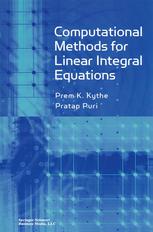

Most ebook files are in PDF format, so you can easily read them using various software such as Foxit Reader or directly on the Google Chrome browser.
Some ebook files are released by publishers in other formats such as .awz, .mobi, .epub, .fb2, etc. You may need to install specific software to read these formats on mobile/PC, such as Calibre.
Please read the tutorial at this link: https://ebookbell.com/faq
We offer FREE conversion to the popular formats you request; however, this may take some time. Therefore, right after payment, please email us, and we will try to provide the service as quickly as possible.
For some exceptional file formats or broken links (if any), please refrain from opening any disputes. Instead, email us first, and we will try to assist within a maximum of 6 hours.
EbookBell Team

4.0
46 reviewsThis book presents numerical methods and computational aspects for linear integral equations. Such equations occur in various areas of applied mathematics, physics, and engineering. The material covered in this book, though not exhaustive, offers useful techniques for solving a variety of problems. Historical information cover ing the nineteenth and twentieth centuries is available in fragments in Kantorovich and Krylov (1958), Anselone (1964), Mikhlin (1967), Lonseth (1977), Atkinson (1976), Baker (1978), Kondo (1991), and Brunner (1997). Integral equations are encountered in a variety of applications in many fields including continuum mechanics, potential theory, geophysics, electricity and mag netism, kinetic theory of gases, hereditary phenomena in physics and biology, renewal theory, quantum mechanics, radiation, optimization, optimal control sys tems, communication theory, mathematical economics, population genetics, queue ing theory, and medicine. Most of the boundary value problems involving differ ential equations can be converted into problems in integral equations, but there are certain problems which can be formulated only in terms of integral equations. A computational approach to the solution of integral equations is, therefore, an essential branch of scientific inquiry.